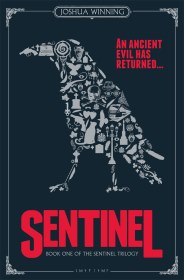GUEST BLOG Publishing Your Book
Josh Winning's novel Sentinel is about to be released and here he offers his advice about getting your first book out there
This is a guest blog by writer Josh Winning ...

Most kids want to be astronauts or superheroes when they grow up. I wanted to be an author. My biggest dream was that one day I'd hold a book in my hands that had my name on the cover.
In March 2014, I held a book in my hands that had my name on the cover. It was surreal, the culmination of years' worth of feverish scribbling and crippling self-doubt. I'd spent almost 16 years chipping away at a single book, and suddenly there it was, all bound and gorgeous. It had a cover and everything.
I started writing Sentinel when I was 15. I'd written book-like things since I was a kid, mostly throwaway genre stuff that wasn't particularly good. The world I created in Sentinel , though, was one that I loved being in – a fantasy world set in a recognisable present, only slightly skewed. And full of monsters.
I sporadically escaped into that world while finishing school, then graduating university, then trying to get a job. I found that life wasn't really conducive to writing, but to be a half-decent writer, you sort of have to experience some of it.
In 2013, when I finally had a draft of Sentinel that felt finished (I'm a serial tinkerer and there really is no such thing as a "final draft"), I attempted to land an agent. I also approached the usual publishing houses and I received a mailbox full of delightfully bland rejection letters in return. Because I'm stubborn and can't take no for an answer, I turned to a newfangled thing called self-publishing.
Weekly digests, tales from the communities you love, and more
It seemed like the right thing to do, and with a platform like Amazon Kindle Direct Publishing (KDP), I discovered it was ridiculously easy. I became a one-man army. I designed a cover and I uploaded a Word document onto KDP. Presto, I'd released Sentinel as an ebook. I sent free digital copies to all the book blogs I could find. Some reviewed it. Some didn't. I offered myself up as a sacrifice to more Q&A sessions than I can count. I joined Goodreads . I was met with excitement, indifference and the odd torrent of bile. I learned a hell of a lot.
The thing about putting a book out there? People treat it like an actual book. They have opinions. They need to know why a character is doing a certain thing at a certain time. Through conversations with other indie authors and blog reviewers, I discovered things about writing that hadn't even occurred to me. Like something called "head hopping" (please Google it).
I also learned that no matter how much you and other people love your book, there are certain people who will hate it. Unreservedly. And they're not afraid to tell you that. Your only response to that (apart from "F$£%&£$CK!") has to be: “C'est la vie.”
Then in September 2013, Peridot Press approached me through a mutual contact about taking a look at Sentinel . Expecting the usual knock-back, I sent over the full manuscript and, to my total bewilderment, a few months later they offered me a publishing contract. Yep, surreal – and I didn't really believe it until I'd signed the bottom line.
Having a publisher definitely lends legitimacy to an author and their book. In truth, that's the main benefit over being a self-published author. Books can only be kept alive by people reading and talking about them, but a lot of magazines and blogs refuse outright to even look at an indie book, let alone read one.
That's understandable considering some of what's out there, but disheartening if you're genuinely proud of what you've written and think it's worthy of at least a cursory glance.
The other benefit is having an editor there questioning every comma, every line of dialogue and every plot point with the kind of unemotional laser vision that makes the Terminator look positively laid back. The edit is the fun part, though, and I'm happy knowing that Sentinel is in the best shape it's ever been in.

Though I'm still learning every day (especially now that I'm writing Ruins , the second book in the Sentinel Trilogy and a whole other kettle of fish), there are certain things that seem to apply to every start-out author.
Firstly: write, write, write. Then write more. Keep writing until you're so sick of writing you want to throw your computer in the dustbin and bazooka the dustbin. That's what it takes to be a writer. You'll probably hate everything you write, but soon enough you'll start not hating it. You might even like it. The other thing: read, read, read. Read far, read wide, read everything.
Secondly : be your own worst critic. Edit like a mad person. If something isn't working, take it the hell out. If you don't think a particular sentence is doing its job, for God's sake change it. People are going to read this stuff, and they're not always going to be kind.
One more: write because you have to, because there are stories in your head that will only be quiet once they're on the page (if you're lucky). And stick at it. That dream of holding a book with your name on the cover? It can happen.
Sentinel is released on Monday 19 May and you can pre-order the paperback edition now . Josh Winning is a regular contributor to SFX 's sister title Total Film .
SFX Magazine is the world's number one sci-fi, fantasy, and horror magazine published by Future PLC. Established in 1995, SFX Magazine prides itself on writing for its fans, welcoming geeks, collectors, and aficionados into its readership for over 25 years. Covering films, TV shows, books, comics, games, merch, and more, SFX Magazine is published every month. If you love it, chances are we do too and you'll find it in SFX.


